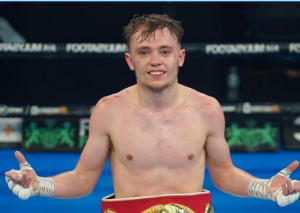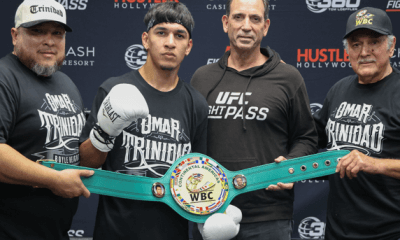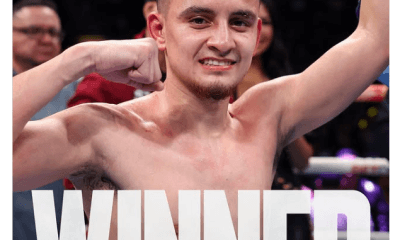Featured Articles
Artem Dalakian, Sunny Edwards, and the Most Storied Title in Boxing

When the mighty Roman Gonzalez departed the 112lb division in 2016 he vacated the title and broke the longest remaining lineage in the sport. In a moment of quiet heartbreak for the boxing aficionado, the final direct link with boxing’s glorious past was cut forever.
That lineage had begun back in 1975 with perhaps the greatest flyweight champion, Miguel Canto. Canto cleaned house that year, shading the wonderful Betulio Gonzalez and the evergreen Shoji Oguma, part of a calendar year that saw him go 6-0 and establish his absolute pre-eminence in the deepest of flyweight divisions. In 1979, old in the face, Canto was out-worked and even in some ramshackle way out-jabbed by a swarming, aggressive Korean named Chan Hee Park. Park was a good fighter, Shoji Oguma lay in wait to send him tumbling with counter-rights, taking his turn in an impressive second tour. In 1981, the new generation asserted itself in the form of Antonio Avelar. Avelar seemed, briefly, to be the real deal but he was unseated by a murderous punching Colombian, Prudencio Cardona, who inflicted upon Avelar the most violent knockout in flyweight history.
This heralded the advent of a series of caretaker champions, good fighters, all, but no great ones as the early eighties evaporated while the hot-potato flyweight championship passed from Fredy Castillo to Eleoncio Mercedes to Charlie Magri and others, none of them holding it for more than a matter of months. When the mighty Sot Chitalada wrestled it from the last caretaker champion in 1984, Canto finally had a descendent who could be named a peer. In two spells, Chitalada held the title into the 1990s whereupon it was ripped from him by the Thai Maungchai Kittikasem who then dropped it to an early emergent of the Soviet and former Soviet schools in Yuri Arbachakov. Arbachakov was the first flyweight whose legacy was to suffer at the hands of the ABC title-belt madness, his record-breaking spell as champion marred by matches with WBC-nominated journeymen. Despite his lengthy title reign, Yuri managed to fight men who were held to belong in the top ten just twice as champion.
Less than a year after the lineal title and Arbakachov were parted, it would be wrapped around the waist of a youngster named Manny Pacquiao, who had crushed Chatchai Sasakul in eight who had in turn outpointed Arbachakov. From the madness of the alphabet soup to the emergence of one of the greatest fighters of our time, the story of the flyweight lineal championship is the story of modern boxing untrampled by titular uncertainty. The history of the championship, of the divisional king, can be traced back to a time when Muhammad Ali ruled the world and so a fistic tendril connects Ali, a hero to his people, to Pacquiao, a hero to his. Pacquiao nearly ruined it all though. Manny missed weight for his 1999 match with Boonsai Sangsurat and had he won that fight, the title would have been vacated as he departed the weight forever, but fortunately, a weight-drained mess, he was crushed in three rounds.
Pongsaklek Wonjongkam then, when he lifted the title in 2001, became the latest great to trace his lineage back to Canto. Wonjongkam’s reign was as modern as can be imagined, dictated thoroughly by ABCs, fought almost exclusively in his backyard, and despite amassing an astonishing twenty title defences in two spells as king, his win resume underwhelms. A list of the worst ever lineal title challengers would draw heavily from Wonjongkam’s opposition.
Wonjongkam made way for Sonny Boy Jaro of The Philippines who made way for Toshiyuki Igarashi and Akira Yaegashi, both of Japan, underlining what has always been the most international of championships. And finally, at the end of the longest road in modern boxing, the title was lain at the feet of a great fighter from Nicaragua, the wonderful Roman Gonzalez.
Roman Gonzalez was my favourite fighters for years, I watched his boxing obsessively. More than a decade ago, I wrote an article predicting his eventual enshrinement as a pound-for-pound number one and his likely vanquishment by a southpaw, even going so far as to predict this would occur up at 115lbs, all of which came true. But it cut me when he stepped aside in 2016, the lineage that had begun with Canto destroyed, a lineage that had run through four different abdications and coronations at 160lbs, that ran all the way back to the last golden age of the flyweight division.
From the ashes, finally, a phoenix menaces. Far from stipulated, certainly not sure, but stirring. On Saturday night, Ukrainian Artem Dalakian (pictured) came to London to meet David Jimenez on the undercard of the Artur Beterbiev-Anthony Yarde fight. Dalakian-Jimenez is one of those rare and wonderful fights British and American fans are sometimes treated to, elite combat athletes who struggle to secure rewarding purses fighting low on a card which a just sport might see them headline. Jimenez, the challenger for Dalakian’s strap, refutes befuddlement with aggression, boxable but brutal, left floundering early in the biggest fight of his career against Ricardo Sandoval only to button up and fire forwards, hard-scrabbling enough rounds to conquer his more cultured foe. This would be his approach, too, against Dalakian. Dalakian is a fighter of no small culture whose activity suffered during those COVID months but with a legacy that stretches back to the last generation of top flyweights and a victory over Brian Viloria. Having boxed just twenty rounds in three years he was now bringing an unfortunate mix of rust and, at thirty-five years old, age.
Nevertheless, for me he dominated Jimenez. The younger man was reasonably quick-handed and tried to remain ambitious in his rushes, but Dalakian was never less than the cleaner puncher and rested on a steeper bank of experience that saw him nullify his more aggressive foe inside while consistently out-scoring him outside. It was a thoroughly impressive performance that confirmed Dalakian’s remaining superiority over most of the rest of the division. Jimenez, in just his thirteenth fight, had established himself firmly in the divisional top five and likely has a future at 112lbs if he wants it. This was a crossroads fight only in the sense that it tested the last generation with the new, and the new was found wanting.
This victory, a unanimous decision over twelve, was a significant one for Dalakian, however. For me, it establishes him as the number one flyweight in the world but at worst he is the number two. The man with whom he shares the top table is one Sunny Edwards, a London boy and very much the division’s coming man. Edwards has boxed nearly as many contests in the upper echelons of the division as Dalakian, and Dalakian’s victory over Viloria aside, Edwards probably has the most meaningful victory of the two having defeated the ageing Moruti Mthalane in early 2021. The recency of his important victories is the source of the tension concerning the number one divisional flyweight currently.

Sunny Edwards
The hope is the two will settle this in the ring.
While it is not unusual for a fighter to arrive from foreign shores and never be seen in a British ring again, it is more often the case that they arrive with targeted opposition when they are boxing at title level, and from Dick Tiger to Zolani Tete, Britain welcomes foreign winners with open arms. It is likely that Dalakian has been brought to Britain to tease a fight with the only man in the division that might be seen as his better and in the only fight either man could hope to box and be similarly enriched. Some promotional tensions exist, but what would be unusual money for a flyweight contest might tip the scales.
And if they settle it in the ring, as the number one and number two flyweight contenders, they will start a new lineage, a new passage of the flyweight title. More than that, the fight would be a fascinating and evenly matched contest between Dalakian, a technician who will likely be forced to box with pressure as a result of his physical limitations and Edwards, a quick-footed slickster who will nevertheless have to commit to outworking maybe the only fighter in the division with superior straight punches. That is not to say that Mexican Julio Cesar Martinez will be excluded – clearly the division’s number three, he may yet have a say.
But if a new and meaningful lineage is to begin it is Dalakian and Edwards, the two best flyweights on the planet, who must seed it.
To comment on this story in the Fight Forum CLICK HERE
-

 Featured Articles3 weeks ago
Featured Articles3 weeks agoThe Hauser Report: Zayas-Garcia, Pacquiao, Usyk, and the NYSAC
-

 Featured Articles2 weeks ago
Featured Articles2 weeks agoOscar Duarte and Regis Prograis Prevail on an Action-Packed Fight Card in Chicago
-

 Featured Articles1 week ago
Featured Articles1 week agoThe Hauser Report: Cinematic and Literary Notes
-

 Book Review4 days ago
Book Review4 days agoMark Kriegel’s New Book About Mike Tyson is a Must-Read
-

 Featured Articles4 weeks ago
Featured Articles4 weeks agoManny Pacquiao and Mario Barrios Fight to a Draw; Fundora stops Tim Tszyu
-

 Featured Articles4 weeks ago
Featured Articles4 weeks agoArne’s Almanac: Pacquiao-Barrios Redux
-

 Featured Articles3 weeks ago
Featured Articles3 weeks agoRemembering Dwight Muhammad Qawi (1953-2025) and his Triumphant Return to Prison
-

 Featured Articles4 weeks ago
Featured Articles4 weeks agoOleksandr Usyk Continues to Amaze; KOs Daniel Dubois in 5 One-Sided Rounds


















